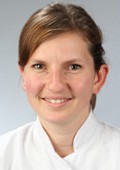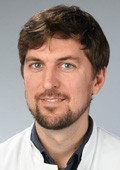
Prof. Dr. med.
Martin
Aepfelbacher
- Director of the institute
- Deputy Director of Center
- Medical specialist in Microbiology, Virology and Infectious Disease Epidemiology
Location
O26 , 2nd Floor
Members of Martin Aepfelbacher's research group mostly work in the field of Cellular Microbiology which has developed at the interface of Cell Biology and Microbiology. Other interests include Molecular Epidemiology of Staphylococcus aureus virulence factors and improvement of methods for diagnosis of infectious diseases.
There are many ways of how pathogens can exploit the elaborate system of cell regulation for their advantage. Pathogens may use surface molecules, structural components or specific effector proteins like toxins to impede the immune system, grow in an intracellular niche, control host cell survival or spread within tissues. The molecular tools that pathogens employ are a remarkable example of the power of coevolution and often are by far more specific and effective than the man-made pharmacological compounds known so far.
We currently investigate how effector proteins of the bacterial enteropathogen Yersinia enterocolitica modulate the activity of Rho GTP-binding proteins and downstream functions in host cells. In another project we evaluate the interaction of staphylococcal surface proteins with components of the extracellular matrix (such as fibronectin) and how this influences the bacteria's ability to interact with cells of the vascular system or complex vascular tissue like heart valves. CDC42GAP is in the center of a project where we look for the dynamics of intracellular vesicle transport during integrin-triggered phagocytosis of bacteria. A long standing interest is on the function and epidemiology of the Staphylococcus aureus toxin EDIN. In a number of clinical microbiological projects i.e. the use of mass spectrometry for rapid bacterial identification or the comparison of molecular sepsis tests in intensive care patients is assessed.
In the more basic projects usually a combination of cell biological, biochemical, biophysical and molecular genetic methods is applied.
You may also
visit the webpage
for further information.
Staff • Group Aepfelbacher • Research lab N27, 02.034-036

Dr. rer. nat.
Gunnar
Baermann
PhD
- Postdoc
Location
Campus Forschung N27 , 2nd Floor, Room number 02.021

Dr. med.
Laura
Berneking
MHBA
- Research fellow
Location
Campus Forschung N27 , 2nd Floor, Room number 023

Alexander
Carsten
M. Sc.
- PhD student
Location
Campus Forschung N27 , 2nd Floor, Room number 02.021

Sören
Henrik
Rob
- PhD student
Location
Campus Forschung N27 , 2nd Floor, Room number 02.036

Claudia
Trasak
- Medical-technical assistant
Location
Campus Forschung N27 , 2nd Floor

Dr. med.
Manuel
Wolters
- Research fellow
- Medical specialist
- Medical specialist in Microbiology, Virology and Infectious Disease Epidemiology
Location
Campus Forschung N27 , 2nd Floor, Room number 023